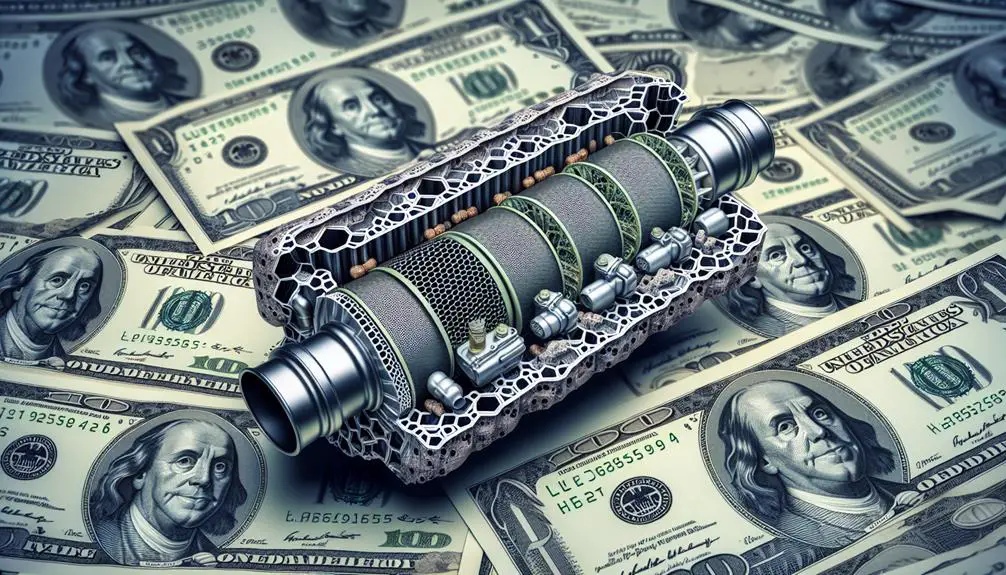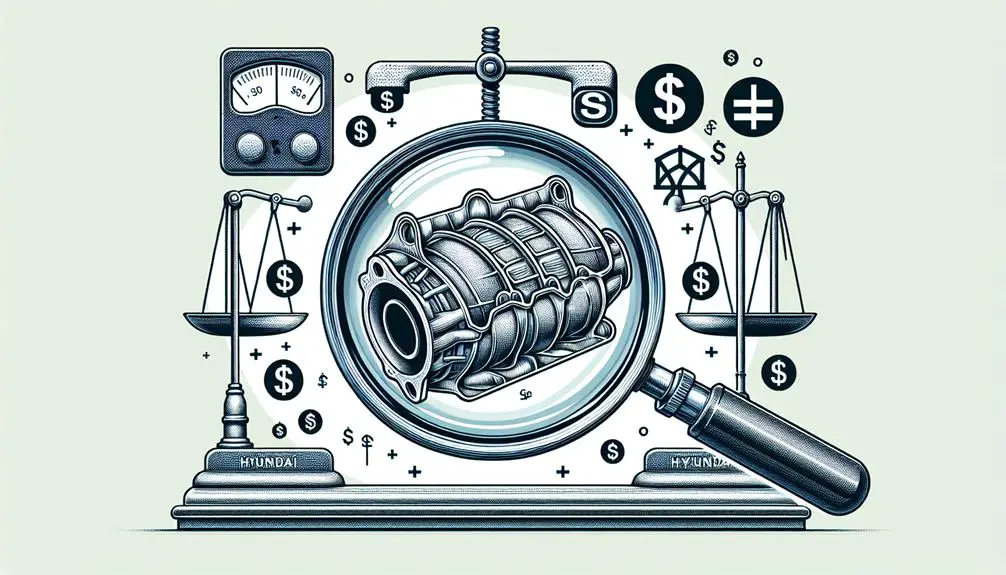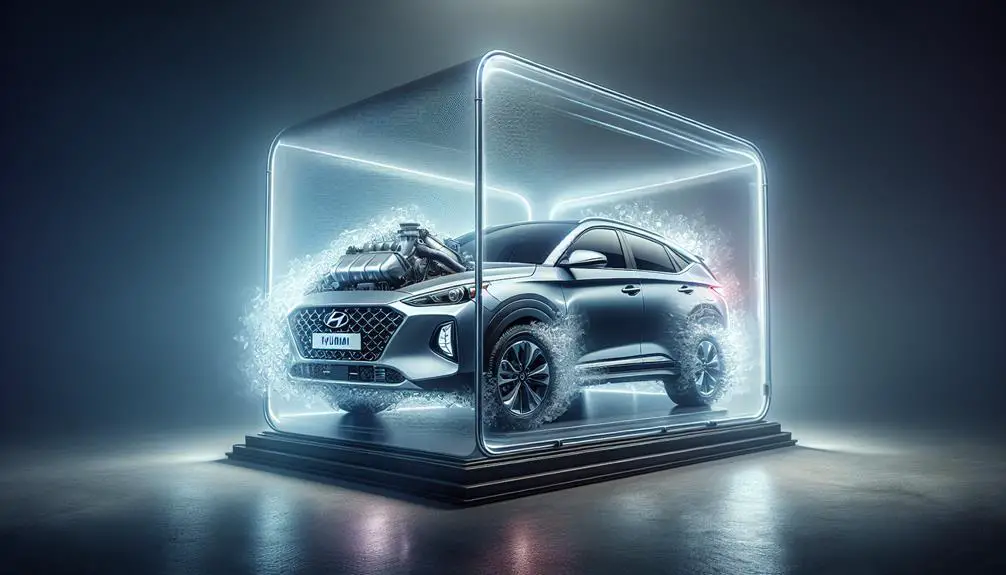The value of a Hyundai catalytic converter can vary widely, primarily depending on the precious metals contained within, its condition, and market prices for metals like platinum, palladium, and rhodium. Investigating Hyundai catalytic converter prices resembles searching for treasure, with your vehicle's hidden value marked on a map.
These components are not merely parts of the exhaust system but are valuable due to the precious metals they incorporate. Understanding factors such as the converter's age, its current state, and fluctuating metal market prices is vital. This knowledge enables you to accurately assess the worth of your converter, guiding you in decisions about selling or replacing it.
Discover how to maximize the financial potential of your converter, seizing the opportunity to benefit from its inherent value.
Understanding Catalytic Converters

A catalytic converter plays an important role in reducing your vehicle's emissions, converting harmful gases into less harmful ones. It's a vital component of your Hyundai's exhaust system, tucked between the engine and the muffler. Its job is to take pollutants created during combustion—like carbon monoxide, nitrogen oxides, and hydrocarbons—and transform them into water vapor and carbon dioxide, which are markedly less harmful to the environment.
Your Hyundai's catalytic converter contains precious metals such as platinum, palladium, and rhodium. These metals act as catalysts, facilitating the chemical reactions that convert the gases without getting consumed in the process. It's a sophisticated piece of engineering designed to meet strict environmental regulations while allowing your car to run efficiently.
Maintaining your catalytic converter in good working order is crucial. A malfunctioning converter can lead to a decrease in fuel efficiency and an increase in pollutant emissions. Also, it's not just about meeting emission standards. A well-functioning catalytic converter ensures that your Hyundai runs smoothly, providing you with a better driving experience while doing your part in protecting the environment.
Factors Affecting Value
Appreciating the value of your Hyundai's catalytic converter involves considering several key factors. It's not just a matter of looking at it and naming a price. You've got to delve deeper into the specifics that make your converter unique and, hence, valuable in its own right. These elements can greatly sway the price you might get for it, if you're selling it as a part or recycling it for its precious metals.
Here are the key factors that affect its value:
- The condition of your converter: Is it in pristine, working order, or has it seen better days? A converter in good condition will always fetch a higher price.
- The current prices of precious metals: Since catalytic converters contain metals like platinum, palladium, and rhodium, their current market prices can greatly impact the value of your converter.
- The specific model of your Hyundai: Some models have converters that are more in demand or contain more precious metals, affecting their value.
- The year of manufacture: Generally, older converters mightn't be as valuable because of wear and potential obsolescence in technology or materials.
Comprehending these factors can give you a clearer picture of what to expect when determining your Hyundai catalytic converter's value.
Estimating Your Converter's Worth

To accurately estimate your Hyundai catalytic converter's worth, you'll need to take into account the specific factors we've discussed.
First, identify your converter's model and year. Since Hyundai has a range of models, the converter's value can greatly vary. You'll find this information important when comparing prices.
Next, assess its condition. A fully functional converter fetches more than one that's on its final legs. However, even non-functioning converters hold value because of the precious metals they contain.
You should also consider the current market prices for precious metals like platinum, palladium, and rhodium. These fluctuate, so it's wise to check the latest rates. The quantity of these metals in your converter influences its total value. Remember, older models might contain more precious metals, potentially increasing their worth.
Lastly, don't overlook the impact of local demand and scrap laws. In some areas, demand for certain converters is higher, which can increase their value. Additionally, regulations regarding the sale and recycling of catalytic converters can affect how much you can get for yours. Keep all these factors in mind to get a realistic estimate of your Hyundai catalytic converter's worth.
Selling Your Catalytic Converter
Once you've determined your Hyundai catalytic converter's worth, it's time to investigate the best avenues for selling it. Selling your converter isn't just about finding a buyer; it's about getting the best deal while ensuring a smooth and safe transaction.
Here are a few options to take into account:
- Online Marketplaces: Platforms like eBay or Craigslist can connect you with buyers nationwide. Just be sure to describe the item accurately and include good-quality photos.
- Scrap Yards: Local scrap yards often buy used catalytic converters. Prices can vary widely, so it's worth calling around to get the best offer.
- Specialized Buyers: Some companies specialize in buying catalytic converters specifically. They might offer competitive prices owing to their expertise in the field.
- Automotive Forums and Communities: There are automotive enthusiasts who may be looking for parts like yours. Joining forums or Facebook groups related to car repairs could help you find a buyer interested in your specific converter.
Protecting Your Converter

Before you sell, it's crucial to safeguard your Hyundai catalytic converter against theft or damage. These components are highly sought after for their precious metals, making them a prime target for thieves. Here's how you can protect yours.
First, consider parking in well-lit areas or secure garages whenever possible. Visibility deters thieves. If you've got a home security camera, make sure it covers the area where you park your car.
You might want to invest in a catalytic converter anti-theft device. These can range from steel cages that encase your converter to simple but effective cable locks. They act as a physical barrier, making theft much harder and much less appealing.
Another practical step is engraving your vehicle identification number (VIN) onto the converter. This doesn't prevent theft, but it makes the stolen item easier to trace and harder for criminals to sell, reducing its attractiveness.
Lastly, stay vigilant. If you hear any unusual sounds from the underside of your car or notice it's running differently, check it out. Thieves can damage the converter while attempting to steal it. Early detection can save you a lot of trouble and expense.
Conclusion
In a nutshell, the value of your Hyundai catalytic converter hinges on several factors including its condition, model, and the precious metals it contains. By evaluating these aspects, you can get a rough estimate of its value.
When you're ready to sell, choose a reputable buyer to guarantee a fair deal. Remember, safeguarding your converter from theft is vital, as its value makes it a target.
Stay informed and proactive to protect and potentially profit from your catalytic converter.